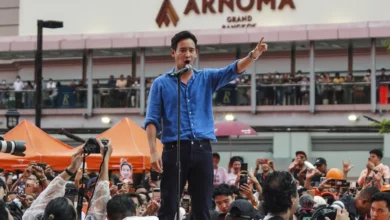Several party leaders, prominent political figures and revolutionary youth criticized the new law issued on exercising political rights because it was never put to discussion. But they also said it does respond to several of the demands of political powers, including full judicial supervision of the elections and the use of national identity cards to vote.
Mohamed ElBaradei, former International Atomic Energy Agency chief and a potential presidential candidate, sarcastically described the new law as “unique”, saying it deprives millions of expatriates of the vote. On Twitter, he said the new law failed identified any regulations to help Egyptians living abroad to vote.
ElBaradei complained of an absence of national dialogue during this critical period. He said that several debates should be taking place regarding the future of Egypt, and remarked that the map for the future is becoming increasingly complicated and ambiguous.
He said there is a need for a clear vision to bolster stability, and wondered why civilians are not able to participate adequately in the political process and why steps have not been taken to draft a new constitution upholding the principles of the 25 January revolution. He warned that elections must take place within a year.
Refat al-Saeed, president of the Tagammu Party, said the law was issued unexpectedly and without consultation, as though the Supreme Council of the Armed Forces (SCAF) does not actually recognize other political powers.
Saeed added that having a judge for every ballot box will be difficult given the lack of security in remote areas where tribalism controls the voting process. He said there will be room for rigging and vote-buying.
Saeed said the new law failed to address certain issues, including setting a ceiling for expenditure on election campaigns and determining how expatriates will vote. He also criticized the law for not tackling the use of religious slogans in election publicity.
Finally, he said that there is not sufficient time for political parties formed after the revolution to prepare, so elections must be postponed.
Ali al-Salmi, meanwhile, the head of the Wafd Party’s shadow government, said the law introduced some positive reforms such as full judicial supervision of elections, the use of the national identity cards to vote, and the exclusion of public figures from the Higher Election Commission. Still, he said political powers and parties should have been consulted.
Asked about the fact that the law does not state whether parliamentary elections will be conducted according to the proportional representation system, Salmi said the law only determines the general guidelines and principles of political engagement. Amendments to parliamentary laws will determine the details.
Contradicting the interpretation of ElBaradei and others, he said the new law has emphasized the right of all Egyptians to exercise their political rights, which indicates that expatriate Egyptians will not be excluded.
Mohamed Abul Ela, a leader from the Nasserist Party, also expressed surprise that the SCAF ignored parties and political powers, failing to discuss the law with them. He also criticized the lack of a mechanism to ban the use of religious mottos and houses of worship in election campaigns, yet pointed out the SCAF heeded calls for judicial supervision and the use of national IDs to vote.
Essam Sultan, the president of the Wassat Party, agreed that the law addressed certain important demands called for by political powers but ignored others.
Khaled Tleima, of the 25 January Revolution Youth Coalition, said the manner in which the SCAF is running the country's affairs is “confusing”.
“While the SCAF called for dialogue with the cabinet and for the resumption of national dialogue on Sunday, it unexpectedly issued this law without any genuine dialogue,” he said, pointing out that Prime Minister Essam Sharaf had promised that no law would be issued before dialogue is conducted.
He added that if the cabinet is being ignored, it should resign, and the SCAF seems to be only changing the “crust” of the former regime. He accused it of exploiting the state of the economy, lack of security and sectarian tension to issue laws that are at odds with the revolution.
Essam al-Erian, spokesperson for the Muslim Brotherhood, criticized the law for not giving a final word on whether the election will be conducted according to proportional representation or individual election.
Asked about reassurances by the SCAF that elections will be held on the scheduled dates, Erian said that the constitutional declaration already assured this. He added that instead of calling for the postponement of elections and the formation of a presidential panel to run national affairs, political parties should be busy preparing for the election.
Sobhi Saleh, a Brotherhood leader, said the law is identical to the one previously suggested by the panel which amended the Constitution. He added that the proportional representation system should be implemented after the transitional period, when a new constitution is formulated. He also said that the Brotherhood does not mind which system will be used.
Translated from the Arabic Edition




